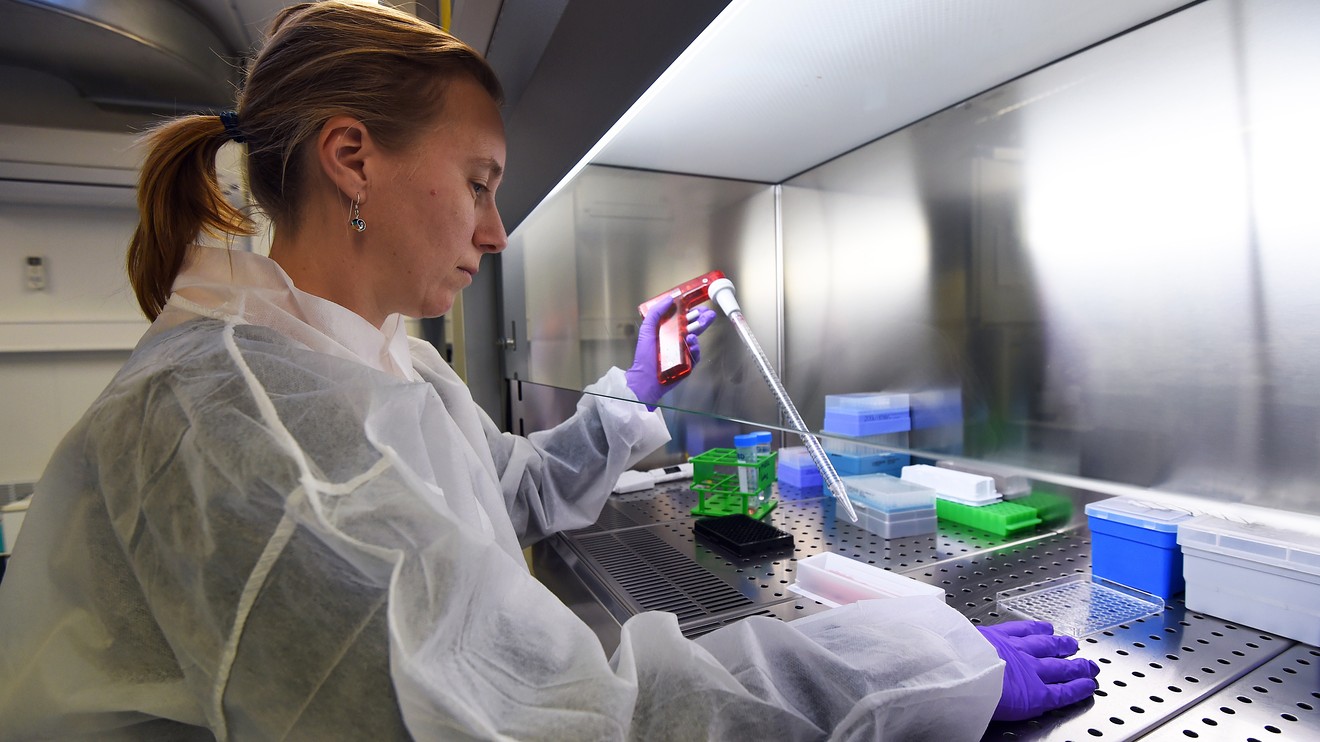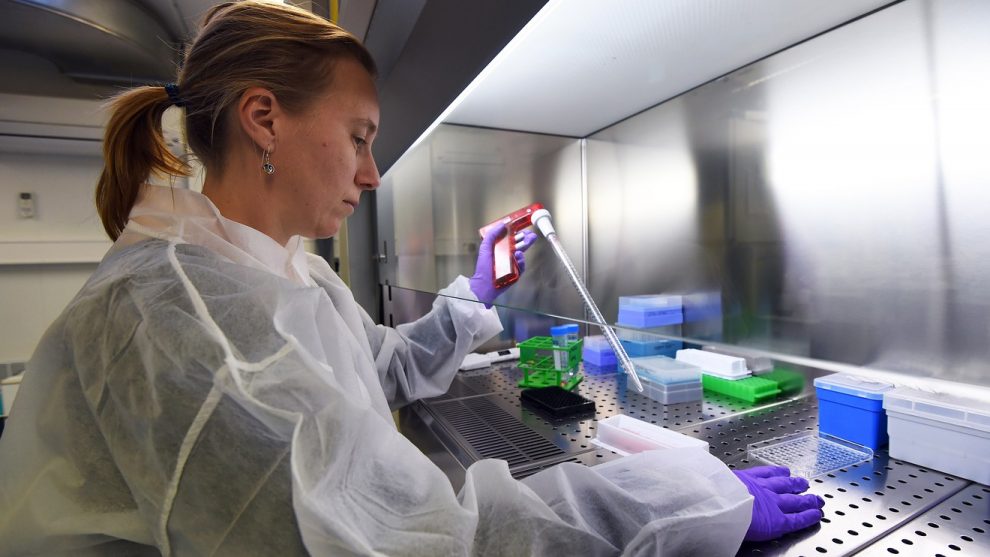
A flurry of biotech initial public offerings is expected to make landfall this week.
Peloton Therapeutics, Ideaya Biosciences, Inc. and U.K.-based Bicycle Therapeutics Plc are expected to price on Wednesday. The companies are all oncology-focused, and are developing drugs targeting everything from transcription factors to the tumors themselves.
Here’s what you need to know about these three biotechs.
Peloton Therapeutics, Inc.
Despite its name, Peloton Therapeutics has nothing to do with exercise bikes. The biotech’s business hinges instead on two drugs that are designed to block a transcription factor called hypoxia-inducible factor-2 alphaαthat — among other things — regulates how the body responds to low oxygen levels. When there’s enough oxygen around, HIF-2 alpha is largely inactive, but under low-oxygen conditions, the molecule picks up steam and causes the body to make proteins that produce new red blood cells and blood vessels. In some diseases, something goes wrong in the HIF-2 alpha system, causing it to drive aberrant blood vessel growth and cell proliferation. That can result in tumors.
Peloton thinks getting HIF-2 alpha under control is the key to treating certain diseases, including certain types of cancer. The company’s lead product is an HIF-2 alpha blocker called PT2977, a potential treatment for advanced kidney cancer and kidney tumors caused by a genetic disorder called von Hippel-Lindau disease. PT2977 is currently in early-phase trials, and Peloton says it will begin enrolling patients for a Phase 3 trial later this year.
The other drug in Peloton’s two-drug pipeline is PT2567, an HIF-2 alpha blocker meant to treat a group of diseases that aren’t related to cancer. The drug is still in the pre-clinical stage of development, so it still has a long way to go before it gets anywhere near an approval by the Food and Drug Administration.
It’s no secret that biotech is a risky business. Peloton has booked a net loss every quarter since its inception and expects to continue to incur significant net losses for the foreseeable future, according to its prospectus. To add to that: Peloton has never generated any revenue, and since none of its products has been approved by the FDA, it could be a long time before it does.
Peloton’s lead drug is aimed at a specific subset of patients and it’s possible it might be approved only as a second or third-line cancer therapy — if it gets approved at all. That would end up being a pretty small market opportunity for the company.
Peloton said it plans to offer around 9.4 million shares priced at between $15 and $17 per share, which means they could raise up to $159.8 million. The company plans to list on the Nasdaq under the symbol “PLTX.” The underwriters on the deal are J.P. Morgan, Citigroup and Jefferies.
Proceeds from the IPO will go to the ongoing trials of PT2977 and PT2567, but will likely not be enough to fund the drugs through regulatory approval. The company will probably need to raise additional capital, Peloton said.
Bicycle Therapeutics Plc
U.K.-based Bicycle Therapeutics also has nothing to do with actual bikes. In this case, a “bicycle” refers to a short, synthetic bit of protein that’s molded to form two loops, reminiscent of two bike wheels. These so-called bicycles form the foundation of the biotech’s four-drug pipeline.
Bicycle Therapeutics’ lead product, BT1718, is a bicycle toxin conjugate, or BTC, designed to destroy tumors that make a certain protein called membrane type 1 matrix metalloprotease, or MT1-MMP. The drug is made up of a toxin that’s been chemically attached to a bicycle. Then, after the drug is administered, the toxin gets cleaved from the bicycle and kills the tumor cells.
BT1718 is being evaluated in early-stage clinical trials. The two other cancer-focused drugs in Bicycle’s pipeline are still in preclinical trials. The company’s one non-oncologic drug, a diabetic macular edema drug developed in partnership with Oxurion N.V., is in early-stage trials.
Outside of Oxurion, the company also has research partnerships with AstraZeneca AZN, -0.05% Bioverativ Inc. and the U.K.-based Dementia Discovery Fund.
Bicycle said in its prospectus that it incurred net losses of $16.3 million and $21.8 million in 2017 and 2018, respectively, and that it expects increasing losses for the foreseeable future. It’s a common statement in biotech prospectuses — these companies are usually working on drugs that are in early-stage or preclinical trials, years away from approval and sales.
Bicycle is planning to offer around 4.3 million shares, priced at between $14 and $16, which means the company could raise up to $69 million. It will trade under the symbol “BCYC” on the Nasdaq. The underwriters on the deal are Goldman Sachs & Co. LLC, Jefferies, Piper Jaffray and Cannacord Genuity.
The bulk of the proceeds from the IPO will go to developing BT1718, Bicycle said in its prospectus. The rest will go to developing its other pipeline drugs and researching and discovering new drugs. Some will also fund working capital and other general corporate purposes.
One more thing investors might want to know: Bicycle executives are making a pretty penny. Chief Executive Kevin Lee was paid a total of $817,894 for his work in 2018, which included a base salary, bonuses, stock grants and other compensation. Chief Financial Officer Lee Kalowski made a total of $520,056 and Chief Medical Officer Maria Koehler made $512,715.
Ideaya Biosciences, Inc.
Ideaya is another cancer-centered biotech. Its focus is precision medicine, which involves making drugs based on the specific molecular profile of patients’ tumors.
Ideaya has an exclusive, worldwide license for a drug called IDE196 that it obtained from pharmaceutical giant Novartis NVS, +0.30% IDE196 is now the company’s most advanced drug candidate in a pipeline of eight drugs, six of which are still in pre-clinical development. It blocks an enzyme called protein kinase C in cancers with two specific gene mutations, dubbed GNAQ and GNA11.
Under the terms of the licensing deal with Novartis, Ideaya will control all future clinical development and all commercial rights to IDE196. The Swiss drugmaker is currently running a Phase 1 clinical trial of the drug as a treatment for a type of eye cancer with a lot of GNAQ or GNA11 gene mutations. Although Ideaya will not have any control over Novartis’ Phase 1 trial, the biotech will be able to use and reference data from the trial as it plans to start another early-stage trial in the second or third quarter of 2019.
Ideaya has raised $140 million from institutional and strategic investors, including Celgene CELG, -0.09% GV, Novartis and Roche Financial Ltd., according to its prospectus. The biotech plans to offer 5 million shares of common stock at $13 to $15 per share in its public debut, meaning it could raise up to $75 million. The company will list on the Nasdaq under “IDYA,” and the underwriters are J.P. Morgan, Citigroup and Jefferies.
The largest proportion of funds from the Ideaya IPO will go to funding IDE 196, including potential milestone payments to Novartis, the company said. A portion will go to the other drugs in Ideaya’s pipeline, including its line of synthetic lethality drugs, as well as early target discovery and validation. Some will also go to working capital and general corporate purposes.
The iShares Nasdaq Biotech ETF IBB, -0.64% has gained 8% in 2019 to date, while the ProShares Ultra Nasdaq Biotech ETF BIB, -1.46% has gained 13%.
The Renaissance IPO ETF IPO, -1.36% has gained 33% and the Renaissance International IPO ETF IPOS, -1.69% has gained 13%. The S&P 500 SPX, -0.58% has gained 14% and the Dow Jones Industrial Average DJIA, -0.38% has added 11%.
Want news about Europe delivered to your inbox? Subscribe to MarketWatch’s free Europe Daily newsletter. Sign up here.









